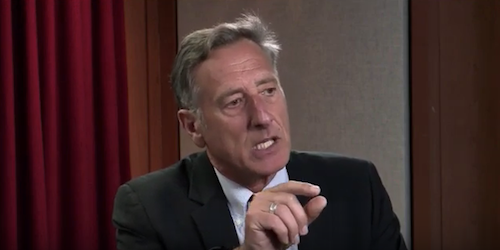MUST SEE – Former Vermont Governor: High Costs & Tax Hikes Doomed State-Level Medicare For All

WASHINGTON – As U.S. Senator Bernie Sanders (I-Vt.) takes the stage at tonight’s Democratic presidential primary debate in Miami, those watching should remember that an effort to implement a Medicare for all-style system in Sanders’s home state of Vermont failed “when it became clear that people would not support the tax increases needed to sustain such a program,” as The New York Times editorial board noted recently.
Roll Call reports that Democratic former Governor Peter Shumlin, who campaigned on a platform of one-size-fits-all health care, admitted that the 11.5 percent payroll tax and 9.5 percent income tax proposed to finance the system were too much for taxpayers to accept: “The final bill was too much for the state to bear, he said. ‘The biggest problem was money,’ Shumlin said … And he couldn’t promise lawmakers that they wouldn’t need to hike taxes again later to accommodate rising health care costs. ‘I couldn’t with a straight face turn to them and say, no, we’ve got this figured out,’ he said.”
To Watch Gov. Shumlin’s Remarks, Click Here Or On The Screenshot Above
The Washington Post reports that the Vermont failure “offers sobering lessons for the current crop of Democrats running for president, including Vermont’s own Sen. Bernie Sanders (I), most of whom embrace Medicare-for-all,” adding: “Then as now, many of the advocates shared ‘a belief that borders on the theological’ that such a system would save money, as one analyst put it – even though no one knew what it would cost when it passed in Vermont. That belief would prove naïve.”
And while Sanders and other supporters of Medicare for all make similarly “naïve” claims about the costs of their national one-size-fits-all system, independent analysts estimate the cost of Medicare for all could be as high as $60 trillion over 10 years, and the nonpartisan Committee for a Responsible Federal Budget (CRFB) finds that even a low-end estimate of $30 trillion over a decade “would mean increasing federal spending by about 60 percent (excluding interest)” and “require the equivalent of tripling payroll taxes or more than doubling all other taxes.”
While examining Sanders’s “misleading” rhetoric, fact-checkers for The Washington Post note that a study by the left-leaning Urban Institute finds that “Sanders’s proposed tax increase would be insufficient and that additional revenue would be needed.”
As CNN reports, “[t]ax experts, however, say that you can’t raise enough money from taxing the rich and that the levies on all Americans may exceed the savings for more people than Sanders expects. This may be particularly true of low-income folks who get heavily subsidized coverage on the Obamacare exchanges … Sanders hasn’t provided a comprehensive analysis of how much the plan … will cost or how he will pay for it … ‘His plan still doesn’t add up,’ [Marc] Goldwein [of the Committee for a Responsible Federal Budget (CRFB)] said … ‘To generate the kind of revenue that Sanders is talking about to pay for something as big as his version of Medicare for All … would be vastly more expensive than any of the kinds of things he’s talking about,’ said Howard Gleckman, senior fellow at the Urban-Brookings Tax Policy Center, a nonpartisan think tank. ‘He’s going to have to come up with more money from some place.’”
“There’s no possible way to finance [Medicare for all] without big middle class tax increases,” CRFB’s Goldwein explained to The Washington Post. Notably, national polling by the Kaiser Family Foundation indicates that six in 10 Americans oppose Medicare for all once they learn it would force families to pay more in taxes.
###
